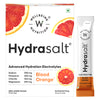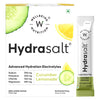Let’s face it—when it comes to staying hydrated, we’ve always been told that nothing beats a glass of water. It’s pure, it’s essential, and it’s been quenching thirst for as long as we’ve been around. But these days, you’ve probably seen a whole new generation of hydration heroes lining the shelves: isotonic drinks. With promises of faster hydration, better performance, and replenishment of lost electrolytes, they sound like something straight out of a sports science lab.
So… are they really better than water? Or just another trend with a flashy label?
Here’s the thing: hydration isn’t one-size-fits-all. Whether you’re going for a run, recovering from an illness, or just trying to beat the summer heat, what your body needs can vary. Sometimes plain water is perfect. Other times, your body might crave more, like the electrolytes and energy a well-formulated isotonic drink can deliver.
Let’s break down the science behind hydration, explore how isotonic drinks actually work, and help you figure out what’s best for you, based on your body, your lifestyle, and your daily demands.
What Is Hydration and Why Is It Crucial?
Hydration refers to the process of providing adequate water and essential electrolytes to maintain proper fluid balance in the body. Water constitutes approximately 60% of an adult's body weight and serves as the medium for virtually every biological process, from cellular function and nutrient transport to temperature regulation and waste removal. (NIH)
Even mild dehydration (losing just 1-2% of your body's water content) can impair cognitive function, reduce physical performance, trigger headaches, and affect mood. (NIH) More severe dehydration can lead to serious health complications, including heat exhaustion, kidney problems, and in extreme cases, life-threatening conditions.
What makes hydration particularly complex is that water alone doesn't tell the complete story. Our bodies require a delicate balance of electrolytes, minerals like sodium, potassium, magnesium, and calcium, that carry electrical charges essential for nerve signaling, muscle contractions, pH balance, and fluid regulation across cell membranes. (NIH) When we sweat or experience illness with fluid loss, we lose both water and these critical electrolytes.
Factors Influencing Hydration Needs
Hydration needs aren’t static. Several factors influence how much, and what kind of fluid you need:
-
Exercise Intensity & Duration: Longer or more intense sessions mean greater sweat (and electrolyte) losses. (NIH)
-
Climate & Environment: Heat, humidity, or high altitudes increase fluid loss through sweat or respiration.. (NIH)
-
Individual Sweat Rate: Some people naturally lose more fluids and electrolytes than others.
-
Health Status: Fever, diarrhea, or vomiting can rapidly deplete both fluids and electrolytes.
In some situations, water is enough. But when fluid loss is substantial, you might need more than just H₂O.
What Are Isotonic Drinks?
Isotonic drinks are specifically formulated beverages with a concentration of dissolved particles (primarily sugars and electrolytes) similar to what's found in human blood. The term "isotonic" refers to this balanced concentration—"iso" meaning equal, and "tonic" referring to strength or concentration.
Key Ingredients in Isotonic Drinks
-
Electrolytes: Mainly sodium and potassium, which support nerve and muscle function. (NIH)
-
Carbohydrates: Usually 6–8% sugars like glucose or maltodextrin, which aid in energy delivery and fluid absorption. (ScienceDirect)
-
Water: The main carrier of nutrients.
-
Optional Add-ins: Some include vitamins, amino acids, or natural flavors for added benefits.
How Do Isotonic Drinks Work?
What makes isotonic drinks so effective is how fast they’re absorbed. Thanks to their balanced composition, they exit the stomach rapidly and enter the small intestine, where fluid absorption occurs. The presence of carbohydrates and sodium activates a “sodium-glucose co-transport” mechanism, which pulls water and nutrients into the bloodstream more efficiently. (ResearchGate)
Research shows that properly formulated isotonic beverages can be absorbed faster than plain water under certain conditions, particularly during and after intense physical activity. (NIH) This faster absorption means quicker rehydration and more efficient delivery of electrolytes to working muscles and tissues.
Benefits of Isotonic Drinks
For many situations, isotonic beverages offer distinct advantages that make them the best drink for hydration:
-
Rapid rehydration during intense physical activity: The optimal balance of carbohydrates and electrolytes facilitates faster fluid absorption when your body needs it most, during extended exercise or in hot conditions when sweat losses are significant. (NIH)
-
Electrolyte replenishment: Perhaps the most important benefit compared to water alone, isotonic drinks replenish the electrolytes lost through sweat. This prevents electrolyte imbalances that can lead to cramping, reduced performance, and even hyponatremia (dangerously low sodium levels) that can occur when drinking excessive amounts of plain water during prolonged exercise. (NIH)
-
Enhanced fluid retention: The sodium content in isotonic beverages helps the body retain the ingested fluid longer, reducing urination frequency compared to drinking plain water, especially beneficial in situations requiring sustained hydration. (NIH)
-
Improves Performance & Recovery: Electrolytes can improve endurance, reduce perceived exertion, and speed up post-exercise recovery by rehydrating and refueling the body effectively. (NIH)
For these reasons, isotonic beverages are often considered the best electrolyte drink for active individuals or anyone experiencing significant fluid and electrolyte losses.
Innovative Hydration Solutions
The decision between water and isotonic drinks should be context-dependent:
-
For daily hydration, casual activity, and workouts under 60 minutes, plain water generally provides adequate hydration.
-
For longer, more intense sessions—especially in hot environments, isotonic beverages offer distinct advantages for maintaining performance and supporting recovery.
When selecting an isotonic option, prioritize clean formulations that steer clear of artificial sweeteners, colors, or excessive sugar content. Products like Wellbeing Nutrition's Hydrasalt exemplify the modern approach to electrolyte supplementation. With zero added sugar, this innovative solution delivers effective hydration using natural fruit extracts for flavor and a comprehensive electrolyte profile derived from sea minerals and Himalayan pink salt. It avoids the common pitfalls of traditional sports drinks, which often contain 5–8 teaspoons of sugar per serving.
Modern formulations that incorporate natural ingredients and intelligent delivery systems offer all the benefits of isotonic drinks, without unnecessary additives. Look for options with balanced electrolyte profiles that rely on functional ingredients rather than artificial compounds. Hydrasalt’s effervescent tablet format adds a layer of convenience and precision, dissolving easily in water to create a perfectly balanced isotonic solution, eliminating the guesswork.
For many individuals, the ideal approach involves a strategic combination of both water and quality isotonic beverages. Let your activity level, environment, and individual physiology guide your hydration choices for optimal performance and well-being. And for those conscious of their sugar intake but still seeking effective electrolyte replenishment, zero-added-sugar formulations represent a meaningful advancement in both sports nutrition and everyday hydration support.
In Summary
Isotonic drinks and water each have their place in your hydration routine. While water is perfect for daily use and light activity, isotonic drinks shine during intense physical effort or when you’re recovering from fluid loss. For clean, effective hydration, choose modern options with functional ingredients so you can hydrate smarter, perform better, and feel your best every day.
FAQs
Can I drink isotonic drinks every day?
Yes, if your lifestyle demands it. For casual activity, water is sufficient. But if you’re active, recovering, or prone to fluid loss, daily use of a clean isotonic drink like HydraSalt can be helpful. Just watch for sugar content in traditional options.
Are isotonic drinks safe for kids or seniors?
They can be, especially during illness or heat exposure. Kids and the elderly are more vulnerable to dehydration. Opt for naturally formulated products like HydraSalt that are free from added sugars and artificial ingredients.
Do isotonic drinks hydrate faster than water?
Yes. Thanks to the sodium-glucose transport mechanism, they speed up water absorption and restore electrolytes more efficiently, especially useful during intense activity or illness.































